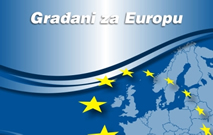THE VISA HOTLINE - initiative in the West Balkan countries
For the first time ever, civil society organizations from five West Balkan countries are taking joint action in order to assess the effects of the visa facilitation agreements and to campaign of a free visa regime.
For that purpose, the Visa Hotline will be launched as an open hotline in Tirana, Sarajevo, Skopje, Podgorica and Belgrade at the same time. Further information will be presented during simultaneous press conferences held in these cities on June 10, 2008 at 12.00 pm.
For the time being, nobody has any reliable information on the implementation of the new visa facilitation agreements. For that very reason, the Visa Hotline will be helpful in determining the level of the realization of the agreements and if they satisfy the needs of different categories of people.
Citizens from the region will have the opportunity to call a telephone number or send an email about their experience in the process of obtaining a visa for the Schengen zone and ask about their rights in the framework of the new visa facilitation agreements. At the other side of the line, experts in visa issues will reply to the requests and take note of different situations these persons encountered when applying for the Schengen visa. The results will be compiled in a study that will be sent to national governments and EU institutions. The hotline is expected to last until September 2008.
The telephone numbers and the e-mail address at the disposal of the citizens in Bosnia and Herzegovina are:
387 63 552 000
387 62 634 000
387 66 471 000
ECAS' partners in the launching of the Visa Hotline on monitoring the visa facilitation agreements: European Movement (Albania), VESTA Association (Bosnia and Herzegovina), Macedonian Centre for International Cooperation (Macedonia), Centre for civic education (Montenegro), Citizens' pact for South East Europe (Serbia).
Since the target group for launching this hotline are not only individuals, but also organizations (travel agencies, sports clubs, NGOs), we anticipate a number of reactions from different categories of the population, including those that do not fall into the categories defines in the visa facilitation agreements.
However, in order to conduct a serious and objective study which would present some indisputable facts about the problem area of obtaining a visa, a scientific-research dimension is also included in this project. To that regard, field teams (in the five countries participating in the project) conducted a survey among visa applicants in front of the Consulates of the following countries: Germany, Italy, Austria, Slovenia and Greece. The survey was based on a questionnaire filled out by randomly selected visa applicants from all 5 West Balkan countries participating in the project (Albania, Bosnia and Herzegovina, Macedonia, Montenegro and Serbia). The quantity of submitted visa requests was the basis for the selection of the Consulates in front of which the survey was conducted, so that the Consulates with the greatest number of submitted requests were included in the project. This part of the project was based on the methodology of the Stefan Battory Foundation, and implemented by ECAS' partners in the field.
The hotline results will mostly be presented in the form of "real-life stories" in order to attract the attention of the decision-makers as successfully as possible. Furthermore, the hotline results will be delivered to the national governments. In addition, a more comprehensive report which will incorporate the survey and hotline findings from all 5 countries participating in the project will be presented in Brussels (to the European Union, the Council of Europe, the European Parliament and the regular representatives of the State Members of the European Union) for the purpose of exerting pressure for the introduction of reliefs and the liberalization of the visa regime.


